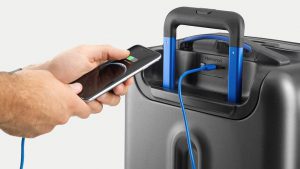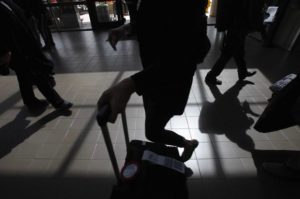![]()
American Airlines jets taxi at Miami International Airport.
The airline is placing restrictions on “smart luggage”
because of concerns that the lithium-ion batteries that power
some bags could pose a fire risk. (Lynne Sladky/AP)
Three U.S. airlines have announced new restrictions on “smart bags” — a new breed of luggage that includes internal tracking devices and smartphone chargers but may pose a risk to air travelers because many of the bags are powered by lithium-ion batteries that could potentially explode and catch fire.
American, Delta and Alaska airlines have all announced that as of Jan. 15, travelers may no longer check smart bags unless their batteries can be removed. The airlines will still allow travelers to bring the bags as carry-ons as long as the batteries are powered down according to existing Federal Aviation Administration regulations. The rationale is that if a battery were to catch fire, it can more easily be extinguished in the passenger cabin vs. in the cargo hold.
American Airlines explained the new policy, announced last week in a statement:
As part of safety management and risk mitigation, we always evaluate ways to enhance our procedures, and the Safety team at American has conducted its own analysis of these bags. Beginning Jan. 15, customers who travel with a smart bag must be able to remove the battery in case the bag has to be checked at any point in the customer’s journey. If the battery cannot be removed, the bag will not be allowed.
Alaska and Delta airlines quickly followed suit. Delta noted in its announcement that it also has taken special steps to handle such incidents.
With the proliferation of powerful lithium-ion batteries used in devices, and as a result of high-profile instances of overheating smartphones and other devices in flight, Delta last year equipped all of its aircraft as well as regional jets operated by its Delta Connection partners with in-cabin containment bags in the event a device powered by a lithium-ion battery experiences a thermal runaway event or fire on board.
A spokeswoman for Southwest Airlines said the carrier is “in the midst of reviewing their policies and considering changes.” Officials from United Airlines have not responded to questions on their policy.
Smart luggage manufacturers have pushed back. One company, Bluesmart, said that more than 65,000 of its suitcases have safely traveled the world and that while it recognizes the concerns, it has worked to ensure that it has “complied with all international regulations defined by [the Department of Transportation] and FAA.”
[What are lithium-ion batteries and why are they so popular?]
“As we speak, we are talking with the airlines so they can review our products and get the proper exemptions in place,” Tomi Pierucci, co-founder and chief executive of Bluesmart, told Forbes. “We are fully compliant with DOT and FAA and the law requires that the product is built the way ours is. We are providing all the technical documentation and the DOT Request for Interpretation as needed.”
The company added in a post on its website:
While most airlines understand and approve of smart luggage, others might still be getting up to speed. We are saddened by these latest changes to some airline regulations and feel it is a step back not only for travel technology but it also presents an obstacle to streamlining and improving the way we all travel.
However, in its post, Delta Air Lines offered this caution:
Many smart bag manufacturers advertise their products as being approved by the Federal Aviation Administration or Transportation Security Administration, which may give customers the false impression that all smart bags are accepted for transport. To date, neither the TSA nor FAA have endorsed a smart bag as approved.
For those new to the latest trend in luggage, smart bags are suitcases or laptop bags that offer built-in extras, such as the ability to charge your phone or track the luggage should it go astray. Other bags are equipped with internal scales to weigh themselves and offer users the ability to remotely lock them using a smartphone app.
But all those extras come with a hitch: Some are powered by lithium-ion batteries, which in 2016 figured prominently in the recall of roughly 2.5 million Samsung Galaxy Note 7 smartphones after reports that their lithium-ion batteries exploded. Those reports led the DOT and FAA to ban the phones from flights.
[“Smart bags” come loaded with innovations to help save you time]
In an emailed statement, Laura Brown, a spokeswoman with the FAA, said the airlines’ actions are “consistent with our guidance that lithium ion batteries should not be carried in the cargo hold.”
——————————————————————-
From : The Washington Post /
Link : https://www.washingtonpost.com/news/dr-gridlock/wp/2017/12/06/thinking-about-getting-one-of-those-smart-bags-for-your-holiday-travel-read-this-first/?utm_term=.7ef08fdcfd0c















